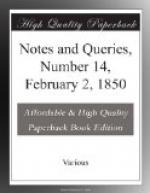7. Identity of Anonymous Annotators.—Can any of the correspondents of “NOTES AND QUERIES” point out to a literary Backwoodsman, like myself, any royal road towards assigning to the proper authors the handwriting of anonymous annotations in fly-leaves and margins? I have many of these, which I should be glad to ascertain.
8. Complutensian Polyglot.—In what review or periodical did there appear, some time ago, a notice of the supposed discovery (or of conjectures as to the existence) of the MSS. from which the “Complutensian Polyglot” was compiled, involving, of course, the repudiation of the common story of the rocket maker of Alcala? Has any further light been thrown on this subject?
9. Blunder in Malone’s Shakspeare.—Has any notice been taken of the following odd blunder in Malone’s Shakspeare, Dublin ed. 1794?
In vol. ii. p. 138, the editor, speaking of John Shakspeare’s will (the father of William), says “This extraordinary will consisted of fourteen articles, but the first leaf being unluckily wanting, I am unable to ascertain either its date, or the particular occasion on which it was written.” He then gives a copy of the will, beginning at the third article, in the middle of a sentence, thus: “... at least spiritually.” Now, in the first vol. p. 154. is a document, professing to be William Shakspeare’s will. But of this the first three paragraphs belong to John Shakspeare’s will, his name being mentioned in each: and the third concludes with the words “at least spiritually.” The fourth paragraph, to the end, belongs to William Shakspeare’s will, as given in Johnson and Stevens’s editions. This is a palpable instance of editorial carelessness: Mr. Malone had mixed the two documents, mislaid the first portion of the transcript of William Shakspeare’s will, and then neglected to examine the postscript, or he must have found out his mistake.
Was this error acknowledged or corrected in any subsequent edition?
JOHN JEBB.
* * * * *
MINOR QUERIES
Mowbray Coheirs.—Collins in his Peerage (ed. Brydges, 1812), says, at p. 18., speaking of Thomas Duke of Norfolk:—
“In 15 Henry VII, he made partition with Maurice, surviving brother of William Marquiss of Berkeley (who died issueless), of the lands that came to them by inheritance, by right of their descent, from the coheirs of Mowbray, Duke of Norfolk;”
and quotes, as his authority, Commun. de T. Pasch, 15 Henry VII., Rot. 1.
The roll of the whole year referred to has been examined, without finding any notice of the subject.
Should any of your readers have met with the statement elsewhere, it may happen that there is some error in Collins’s reference to his authority; and a clue to the right roll, or any other notice of the division of this great inheritance, will be acceptable.




